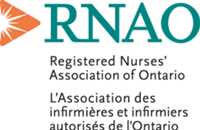RNAO urges health ministers to seize historic opportunity to strengthen Medicare
TORONTO, Jan. 19, 2016 /CNW/ - On the eve of a meeting between provincial and territorial health ministers and their federal counterpart, the Registered Nurses' Association of Ontario (RNAO) urges ministers to forge a new path to strengthen the country's health system.
The meeting, taking place Jan. 20-21 in Vancouver, marks the beginning of discussions between the jurisdictional health ministers and federal Health Minister Dr. Jane Philpott aimed at creating a new health accord. Stephen Harper's Conservative government refused to negotiate a new accord when it expired in 2014.
"The health and health care of Canadians is an issue that hasn't seen any federal leadership for a long time," says Doris Grinspun, RNAO's chief executive officer. "Ontario's registered nurses (RNs), nurse practitioners (NPs) and nursing students are thrilled Dr. Philpott is sitting down with her counterparts to talk about a new accord."
Grinspun says the new agreement should again span 10 years, with annual increases in health transfers of six per cent. It must also include stipulations that these funds can't be used for for-profit schemes such as medical tourism, user fees, co-payments or income-based means testing. "Money can no longer be doled out without considering the dangers of creeping privatization," Grinspun insists. "The federal government has a central role in protecting our public system; one that is cherished by Canadians and the envy of many countries around the world. Nurses want to build on its success to ensure it remains publicly funded, universal, equitable, and without profit motives."
Key to a high performing health system is ensuring it has a robust primary care system, which is the first point of access for patients. Grinspun says Canada falls short in this area compared to other Organization for Economic Co-operation and Development nations. "If we can help the average Canadian see their primary care provider within 24 hours – whether it is a nurse practitioner, physician or registered nurse – we will have achieved a universally accessible system that is more patient-centred, responsive, effective and cost-efficient," she says.
Grinspun adds this is possible if Ottawa and the health ministers set expectations and commit to funding to ensure all health professionals are working together and to their full scope of practice through interprofessional teams. "The first health accord had targeted funding for interprofessional primary care and great progress was made. We now need to continue that progress so we can truly anchor the health system in primary care."
RNAO says Ottawa must also commit to a national pharmacare program. Several health ministers, led by Ontario's Eric Hoskins, have been championing the idea in a bid to control spiraling drug costs. "It's no secret that Canada has some of the highest drug prices in the world, and our existing system of private and public plans is both costly and inefficient," says RNAO President Vanessa Burkoski. "It is shameful that one in four Canadians currently can't afford to fill their prescriptions, while numerous studies have shown a national pharmacare program could save billions of dollars."
Burkoski says she's confident that Minister Philpott is turning a corner away from the hands-off approach that characterized the previous government. Once an agreement is in place, Burkoski hopes Ottawa will also reinstate the Health Council of Canada (HCC), which was set up in 2004 to monitor the success of the previous accord. Part of its mandate included reporting on the country's health system and looking at examples of best practices and innovation.
"We were extremely disappointed that Stephen Harper ended support for the HCC, and failed to recognize the work of a strong, credible, evidence-based organization that produced stellar reports on quality of care, Aboriginal health and system efficiency," says Burkoski. Given its stated commitment to evidence-based policy, she hopes that the new Liberal government will resurrect the council.
RNAO is the professional association representing registered nurses, nurse practitioners, and nursing students in Ontario. Since 1925, RNAO has advocated for healthy public policy, promoted excellence in nursing practice, increased nurses' contribution to shaping the health-care system, and influenced decisions that affect nurses and the public they serve. For more information about RNAO, visit RNAO.ca or follow us on Facebook and Twitter.
SOURCE Registered Nurses' Association of Ontario

to arrange an interview with a nurse, please contact: Marion Zych, Director of Communications, Registered Nurses' Association of Ontario (RNAO), 416-408-5605 (office), 647-406-5605 (cellular)

Share this article